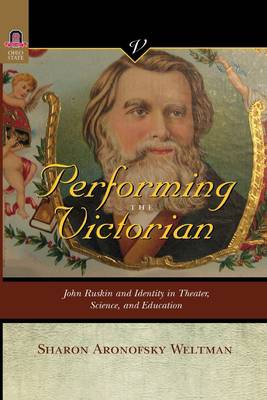
Bedankt voor het vertrouwen het afgelopen jaar! Om jou te bedanken bieden we GRATIS verzending (in België) aan op alles gedurende de hele maand januari.
- Afhalen na 1 uur in een winkel met voorraad
- In januari gratis thuislevering in België
- Ruim aanbod met 7 miljoen producten
Bedankt voor het vertrouwen het afgelopen jaar! Om jou te bedanken bieden we GRATIS verzending (in België) aan op alles gedurende de hele maand januari.
- Afhalen na 1 uur in een winkel met voorraad
- In januari gratis thuislevering in België
- Ruim aanbod met 7 miljoen producten
Zoeken
Performing the Victorian
John Ruskin and Identity in Theater, Science, and Education
Sharon Aronofsky Weltman
€ 33,95
+ 67 punten
Omschrijving
Performing the Victorian: John Ruskin and Identity in Theater, Science, and Education by Sharon Aronofsky Weltman is the first book to examine Ruskin's writing on theater. In works as celebrated as Modern Painters and obscure as Love's Meinie, Ruskin uses his voracious attendance at the theater to illustrate points about social justice, aesthetic practice, and epistemology. Opera, Shakespeare, pantomime, French comedies, juggling acts, and dance prompt his fascination with performed identities that cross boundaries of gender, race, nation, and species. These theatrical examples also reveal the primacy of performance to his understanding of science and education. In addition to Ruskin on theater, Performing the Victorian interprets recent theater portraying Ruskin (The Invention of Love, The Countess, the opera Modern Painters) as merely a Victorian prude or pedophile against which contemporary culture defines itself. These theatrical depictions may be compared to concurrent plays about Ruskin's friend and student Oscar Wilde (Gross Indecency: The Three Trials of Oscar Wilde, The Judas Kiss). Like Ruskin, Wilde is misrepresented on the fin-de-millennial stage, in his case anachronistically as an icon of homosexual identity. These recent characterizations offer a set of static identity labels that constrain contemporary audiences more rigidly than the mercurial selves conjured in the prose of either Ruskin or Wilde.
Specificaties
Betrokkenen
- Auteur(s):
- Uitgeverij:
Inhoud
- Aantal bladzijden:
- 196
- Taal:
- Engels
- Reeks:
Eigenschappen
- Productcode (EAN):
- 9780814257609
- Verschijningsdatum:
- 29/01/2021
- Uitvoering:
- Paperback
- Formaat:
- Trade paperback (VS)
- Afmetingen:
- 152 mm x 229 mm
- Gewicht:
- 294 g

Alleen bij Standaard Boekhandel
+ 67 punten op je klantenkaart van Standaard Boekhandel
Beoordelingen
We publiceren alleen reviews die voldoen aan de voorwaarden voor reviews. Bekijk onze voorwaarden voor reviews.









